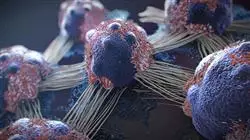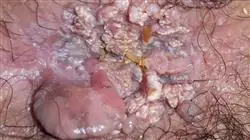University certificate
The world's largest faculty of medicine”
Introduction to the Program
A high-quality educational program that includes updates on the approach to condyloma and obstructive defecatory syndromes"

Despite being a complex pathology that encompasses many systems, inflammatory bowel disease has anorectal manifestations that are difficult to treat; therefore, a comprehensive assessment of both medical and surgical management is the cornerstone for successful therapy. It is equally important to acquire updated knowledge in this constantly evolving field.
The student will learn and reinforce their knowledge about trauma, anorectal foreign bodies and benign anorectal neoplasms with special attention to therapeutic algorithms with clinical cases and illustrative images. Although it is not a topic covered in the "classic" proctology and Pelvic Floor manuals, we believe it is necessary for the student to acquire knowledge of current consultation topics such as anal esthetics, skin tags and anal bleaching.
Proctologists must demonstrate the highest level of preparation and possess a clear understanding of incontinence and constipation. In these sections the student will develop skills to perform an adequate assessment using the best valued methods and questionnaires, in order to reach accurate diagnoses and learn to offer the best surgical and non-surgical treatments. We have done all this with a special interest in generating practical knowledge, delving into clinical cases, illustrative videos and therapeutic algorithms.
Handling aside, the anterior resection syndrome deserves a special section. Due to new technologies and surgical accesses, the percentage of patients who have undergone rectal cancer surgery and generate an anterior resection syndrome is increasingly higher. Therefore, a correct assessment and indication of the different treatments is of vital importance for the student's education.
We have grouped the main causes of pelvic pain so that the student knows how to identify and make a correct differential diagnosis between proctalgia fugax, coccydynia, pudendal neuralgia and deep endometriosis. We also propose a practical and updated management of these pathologies.
We end the module with a current topic that a proctological surgeon should be aware of, Pelvic Floor rehabilitation and biofeedback.
The student will understand and know how to interpret the complementary and radiological tests that are frequently used in these pathologies.
Acquire the most comprehensive knowledge in the diagnosis and treatment of the most important pathologies and new situations that the proctologists encounter in their clinical practice in the Pelvic Floor area"
This Postgraduate diploma in Pelvic Floor contains the most complete and up-to-date scientific program on the market. The most important features include:
- Development of a Large Number of Case Studies Presented by Experts
- Graphic, schematic, and highly practical contents
- The latest developments and cutting-edge advances in this field
- Practical exercises to perform the self-assessment process to improve learning
- Innovative and highly efficient methodologies
- Theoretical lessons, questions to the expert, debate forums on controversial topics, and individual reflection assignments
- Content that is accessible from any fixed or portable device with an Internet connection
A unique Postgraduate diploma that perfectly combines educational intensity with the most innovative knowledge and techniques in the sector, with the flexibility that the working professional needs"
This Postgraduate diploma is focused on the practical applications of the theories covered herein. Through the most effective teaching systems, proven methods imported from the most prestigious universities in the world, you will be able to acquire new knowledge in a practical way. In this way, we strive to convert your efforts into real and immediate skills.
Our online system is another strength of our educational program. With an interactive platform that has the advantages of the latest technological developments, we put the most interactive digital tools at your service. This way, we can offer you a learning method that can be completely adapted to your needs, so that you can perfectly balance this educational program with your personal or professional life.
Proctologists must demonstrate the highest level of preparation and possess a clear understanding of incontinence and constipation.
Obstructive defecatory syndrome is the most important issue in Pelvic Floor pathology.
An educational program created to allow you to implement your acquired knowledge into your daily practice almost immediately"

This 100% online Postgraduate diploma will allow you to balance your studies with your professional work while increasing your knowledge in this field"
Why study at TECH?
TECH is the world’s largest online university. With an impressive catalog of more than 14,000 university programs available in 11 languages, it is positioned as a leader in employability, with a 99% job placement rate. In addition, it relies on an enormous faculty of more than 6,000 professors of the highest international renown.

Study at the world's largest online university and guarantee your professional success. The future starts at TECH”
The world’s best online university according to FORBES
The prestigious Forbes magazine, specialized in business and finance, has highlighted TECH as “the world's best online university” This is what they have recently stated in an article in their digital edition in which they echo the success story of this institution, “thanks to the academic offer it provides, the selection of its teaching staff, and an innovative learning method aimed at educating the professionals of the future”
A revolutionary study method, a cutting-edge faculty and a practical focus: the key to TECH's success.
The most complete study plans on the university scene
TECH offers the most complete study plans on the university scene, with syllabuses that cover fundamental concepts and, at the same time, the main scientific advances in their specific scientific areas. In addition, these programs are continuously being updated to guarantee students the academic vanguard and the most in-demand professional skills. In this way, the university's qualifications provide its graduates with a significant advantage to propel their careers to success.
TECH offers the most comprehensive and intensive study plans on the current university scene.
A world-class teaching staff
TECH's teaching staff is made up of more than 6,000 professors with the highest international recognition. Professors, researchers and top executives of multinational companies, including Isaiah Covington, performance coach of the Boston Celtics; Magda Romanska, principal investigator at Harvard MetaLAB; Ignacio Wistumba, chairman of the department of translational molecular pathology at MD Anderson Cancer Center; and D.W. Pine, creative director of TIME magazine, among others.
Internationally renowned experts, specialized in different branches of Health, Technology, Communication and Business, form part of the TECH faculty.
A unique learning method
TECH is the first university to use Relearning in all its programs. It is the best online learning methodology, accredited with international teaching quality certifications, provided by prestigious educational agencies. In addition, this disruptive educational model is complemented with the “Case Method”, thereby setting up a unique online teaching strategy. Innovative teaching resources are also implemented, including detailed videos, infographics and interactive summaries.
TECH combines Relearning and the Case Method in all its university programs to guarantee excellent theoretical and practical learning, studying whenever and wherever you want.
The world's largest online university
TECH is the world’s largest online university. We are the largest educational institution, with the best and widest online educational catalog, one hundred percent online and covering the vast majority of areas of knowledge. We offer a large selection of our own degrees and accredited online undergraduate and postgraduate degrees. In total, more than 14,000 university degrees, in eleven different languages, make us the largest educational largest in the world.
TECH has the world's most extensive catalog of academic and official programs, available in more than 11 languages.
Google Premier Partner
The American technology giant has awarded TECH the Google Google Premier Partner badge. This award, which is only available to 3% of the world's companies, highlights the efficient, flexible and tailored experience that this university provides to students. The recognition as a Google Premier Partner not only accredits the maximum rigor, performance and investment in TECH's digital infrastructures, but also places this university as one of the world's leading technology companies.
Google has positioned TECH in the top 3% of the world's most important technology companies by awarding it its Google Premier Partner badge.
The official online university of the NBA
TECH is the official online university of the NBA. Thanks to our agreement with the biggest league in basketball, we offer our students exclusive university programs, as well as a wide variety of educational resources focused on the business of the league and other areas of the sports industry. Each program is made up of a uniquely designed syllabus and features exceptional guest hosts: professionals with a distinguished sports background who will offer their expertise on the most relevant topics.
TECH has been selected by the NBA, the world's top basketball league, as its official online university.
The top-rated university by its students
Students have positioned TECH as the world's top-rated university on the main review websites, with a highest rating of 4.9 out of 5, obtained from more than 1,000 reviews. These results consolidate TECH as the benchmark university institution at an international level, reflecting the excellence and positive impact of its educational model.” reflecting the excellence and positive impact of its educational model.”
TECH is the world’s top-rated university by its students.
Leaders in employability
TECH has managed to become the leading university in employability. 99% of its students obtain jobs in the academic field they have studied, within one year of completing any of the university's programs. A similar number achieve immediate career enhancement. All this thanks to a study methodology that bases its effectiveness on the acquisition of practical skills, which are absolutely necessary for professional development.
99% of TECH graduates find a job within a year of completing their studies.
Postgraduate Diploma in Pelvic Floor
Due to the high rates of occurrence and affectation of pelvic floor pathologies, the study of this type of anomalies has gained great relevance for modern medicine, with constant methodological and protocol advances in their treatment. This continuous development of the sector has led professionals specialized in the field to a scenario in which constant academic updating stands out as an essential requirement for optimal development in the area. Understanding this fact, in TECH Global University we have prepared our Postgraduate Diploma program in Pelvic Floor focused on the training of the professional. In this postgraduate program, special attention will be paid to the practical management of biofeedback procedures used in pelvic floor rehabilitation processes. Similarly, it will delve into the modernization of the following aspects: the different possibilities of implementation of robotic and laparoscopic surgery of the pelvic floor in the management of cases of rectocele and enterocele; and knowledge of the different treatment alternatives in the care of anorectal inflammatory bowel disease.
Study a Pelvic Floor Postgraduate Diploma online
The large number of rectal and intestinal pathologies that can significantly affect the pelvic floor of an individual make this field of medicine one of the most demanding areas with respect to the degree of knowledge of its specialized professionals. In our Postgraduate Diploma program you will address the set of major challenges and difficulties that accompany the development processes in the area of pelvic floor health care, contemplating its various possibilities of resolution. Likewise, in this postgraduate program you will deepen in the updating of the following concepts: knowledge of the new methodologies and processes applied to the correction and treatment of cases of rectal prolapse; and the identification of the different possibilities of medical approach in the management of patients with deep endometriosis.







